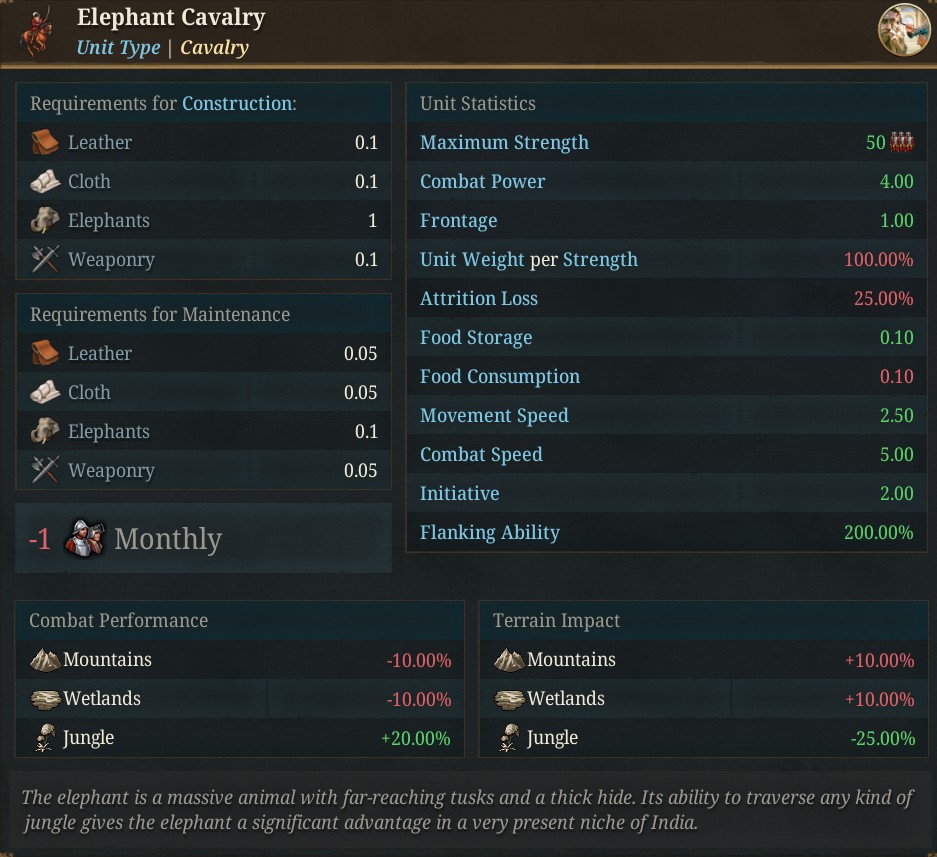Hello, and welcome one more week to Tinto Flavour, the happy Fridays Tuesdays & Fridays in which we take a look at the content of Europa Universalis V!
Today we will talk about three topics: the generic content available for most of the countries in India; the unique content of Vijyanagar; and other regional content available for other Indian countries. A meaty TF, so let’s start without further ado!
Let’s start by talking about the generic content available for Indian countries. There are some reforms, policies, and units that are available to most countries, like these:



The Paik System unlocks three types of levies, depending on the age:



There are also Elephant units:


And a building that produces Ivory from Elephants - For those of you not so tuned into the Tinto Maps series, we’re representing African elephants with the Ivory resource, and the Indian elephants with the Elephants resource, so it can be used for units (as Elephants), or for other economic purposes, by transforming it first into Ivory with this building:

Advances like:

And a unique type of vassalage - The Samanta System, with 3 different subject types:




Finally, let’s take a look at the flavour naming of the states in the Hindu Indian countries:

Let’s now take a look at the unique flavour content of Vijayanagar, a country that in 1337 was leading the resistance against the Sultanate of Delhi in Southern India:



Vijayanagar has a unique policy for the Administrative System law:

It also has unique advances, as usual:




And it also has several flavour events, such as:






Another country with unique content is Orissa, which has a very interesting setup, with some countries as Samanta subjects:






We also have unique content for countries such as Bengal, Bahmani, and Pandua. For example, in the first case, it starts as three independent countries, which in the case of unifying the region and forming the Sultanate of Bengal:

Would get contents and events such as:

Finally, we also have a bunch of content for other formable countries, that will work as ‘regional powers’ with unique content such as advances, etc. This is a list of these formables:
…But since this Tinto Flavour is already long enough, you’ll have to find out about it when playing our game, as that’s all for today!
Remember that tomorrow there will be a Tinto Talks about Hinduism, Jainism & Sikhism; on Friday a Tinto Flavour about Delhi; and next Monday we will have the Tinto Maps Feedback for India. Cheers!
Today we will talk about three topics: the generic content available for most of the countries in India; the unique content of Vijyanagar; and other regional content available for other Indian countries. A meaty TF, so let’s start without further ado!
Let’s start by talking about the generic content available for Indian countries. There are some reforms, policies, and units that are available to most countries, like these:



The Paik System unlocks three types of levies, depending on the age:



There are also Elephant units:


And a building that produces Ivory from Elephants - For those of you not so tuned into the Tinto Maps series, we’re representing African elephants with the Ivory resource, and the Indian elephants with the Elephants resource, so it can be used for units (as Elephants), or for other economic purposes, by transforming it first into Ivory with this building:

Advances like:

And a unique type of vassalage - The Samanta System, with 3 different subject types:




Finally, let’s take a look at the flavour naming of the states in the Hindu Indian countries:

Let’s now take a look at the unique flavour content of Vijayanagar, a country that in 1337 was leading the resistance against the Sultanate of Delhi in Southern India:



Vijayanagar has a unique policy for the Administrative System law:

It also has unique advances, as usual:




And it also has several flavour events, such as:






Another country with unique content is Orissa, which has a very interesting setup, with some countries as Samanta subjects:






We also have unique content for countries such as Bengal, Bahmani, and Pandua. For example, in the first case, it starts as three independent countries, which in the case of unifying the region and forming the Sultanate of Bengal:

Would get contents and events such as:

Finally, we also have a bunch of content for other formable countries, that will work as ‘regional powers’ with unique content such as advances, etc. This is a list of these formables:
- Deccan
- Gujarat
- Hindustan
- Marathas
- Mughals
- Nepal
- Punjab
- Rajputana
…But since this Tinto Flavour is already long enough, you’ll have to find out about it when playing our game, as that’s all for today!
Remember that tomorrow there will be a Tinto Talks about Hinduism, Jainism & Sikhism; on Friday a Tinto Flavour about Delhi; and next Monday we will have the Tinto Maps Feedback for India. Cheers!






